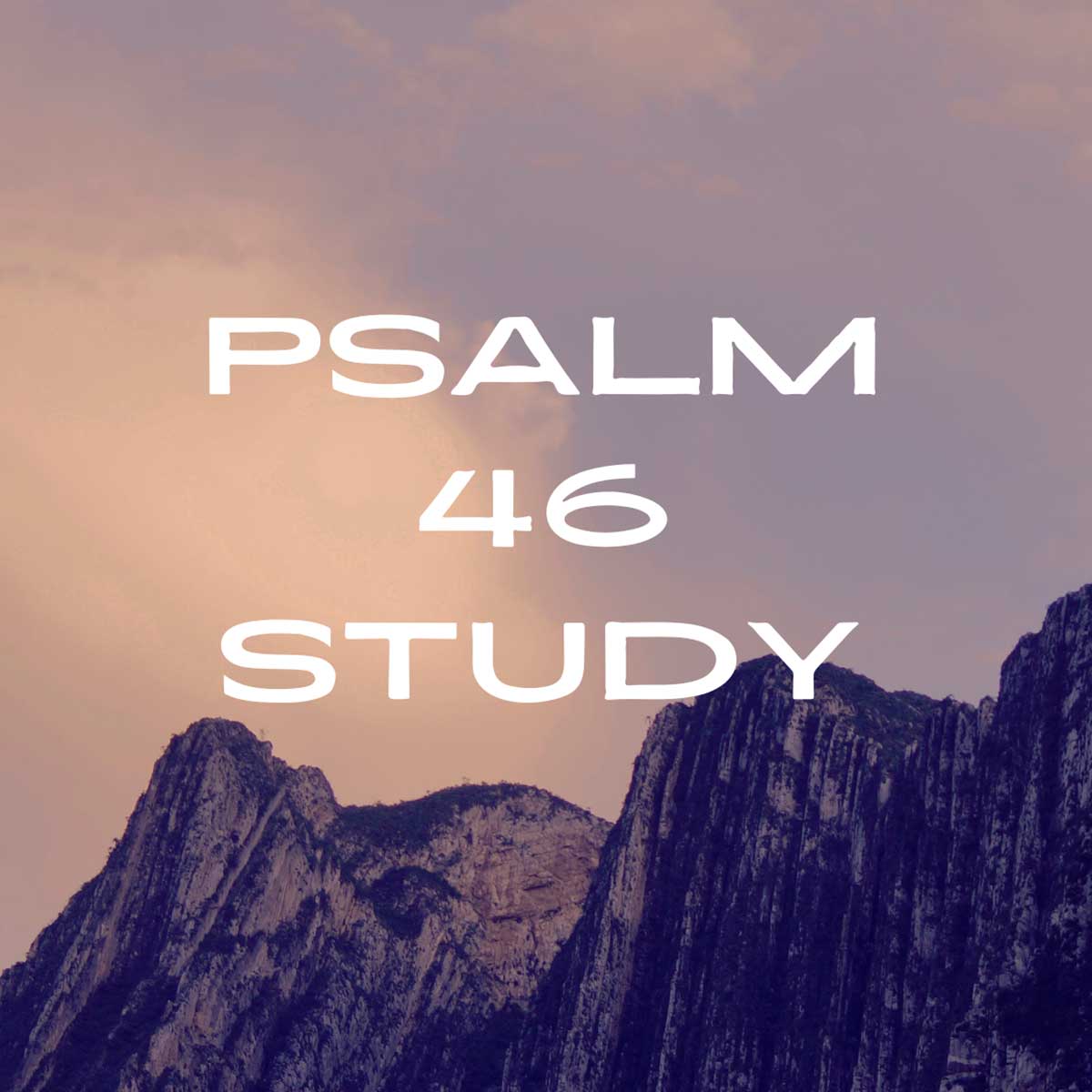Psalm 46 Study
The Psalm 46 Study reveals a powerful message about the protection and refuge that God offers His children. This psalm is one of the most encouraging in the Bible, providing comfort in times of tribulation. In this study, we will explore the meaning of each verse, its application to Christian life, and how we can find peace in divine promises.
The Context – Psalm 46 Study
Psalm 46 was written to express God’s sovereignty over all circumstances. This psalm was sung by the sons of Korah and conveys a message of security and hope.
Scholars believe that this psalm may have been written during a time of great adversity for Israel, perhaps during a siege or an imminent battle. Even in the midst of chaos, the psalmist declares absolute trust in God.
The historical context of Psalm 46 suggests that it may have been composed during the days of King Hezekiah, when Jerusalem was besieged by the Assyrian army. On that occasion, God demonstrated His power by delivering His people in a supernatural manner. This experience strengthened the faith of the people and served as a testimony to divine faithfulness.
The Meaning of Each Verse – Psalm 46 Study
Verse 1
“God is our refuge and strength, an ever-present help in trouble.”
- Explanation:
This verse begins the psalm by proclaiming the security and protection we find in God. He is described as a “refuge” and “strength,” indicating that, in the midst of life’s dangers and adversities, we can find shelter and strength in Him. The term “ever-present help in trouble” emphasizes that, in times of difficulty, God is immediately available to assist.
Verse 2
“Therefore we will not fear, though the earth give way and the mountains fall into the heart of the sea.”
- Explanation:
Here, the trust in God is so great that even in the face of drastic changes and instabilities (symbolized by a shifting earth and mountains being carried into the sea), there is no reason for fear. This image expresses the idea that if the natural world—which would normally be stable—can be shaken, our trust in God—who is eternal and unchanging—sustains us in any situation.
Verse 3
“Though its waters roar and foam, though the mountains quake with their surging. (Selah.)”
- Explanation:
Continuing the metaphor of the forces of nature, the psalmist describes scenes of chaos and turbulence: roaring waters (indicating tumult and uncontrolled force) and trembling mountains. These images represent the crises and problems that may arise. The word “Selah” likely invites a pause and reflection, allowing the reader to meditate on the grandeur and power of God amid the chaos.
Verse 4
“There is a river whose streams make glad the city of God, the holy place where the Most High dwells.”
- Explanation:
The image shifts to a note of hope and vitality. The “river” symbolizes the life, renewal, and peace that flow from God, bringing joy and fertility to the “sanctuary”—which can be understood as the community of the faithful or the very presence of God. This city of God is a place of security and communion with the Most High, contrasting with the instability described earlier.
Verse 5
“God is within her, she will not fall; God will help her at break of day.”
- Explanation:
The psalmist reinforces that God’s presence within this “city” (a symbol of the community of believers or the place where God dwells) is a guarantee of stability. Even if opposing forces are at work, this city cannot be shaken because God is at its center. The mention of “break of day” brings the idea of hope and renewal: just as the day dawns, divine help also arrives, dispelling darkness and adversity.
Verse 6
“Nations are in uproar, kingdoms fall; he speaks, and the earth melts.”
- Explanation:
This verse demonstrates God’s power over nations and kingdoms. “Nations” and “kingdoms” that are agitated and moved represent human and political forces, which are thrown into disarray before divine authority. When God “speaks,” even nature responds—the earth melts, symbolizing the submission of all creation to God’s will. It is a declaration of the Lord’s supreme power over all kingdoms and elements of nature.
Verse 7
“The Lord Almighty is with us; the God of Jacob is our refuge. (Selah.)”
- Explanation:
Here, there is a reaffirmation of divine presence and protection. The title “Lord Almighty” emphasizes that God commands a powerful celestial host, demonstrating His ability to defend and fight for His people. The reference to “God of Jacob” connects the psalm to the history of the people of Israel, recalling God’s covenant and care for those who trust in Him. Again, “Selah” invites a pause for meditation and reflection on this reality.
Verse 8
“Come, behold the works of the Lord; see the desolations he has brought on the earth!”
- Explanation:
This verse invites the faithful to observe and reflect on the powerful actions of God. The “works of the Lord” include both salvation and protection, as well as the execution of judgments that may result in “desolations.” It is a call to recognize that although God is loving and protective, He also acts to correct injustice and establish order, putting an end to violence and war.
Verse 9
“He makes wars cease to the ends of the earth; he breaks the bow and shatters the spear; he burns the chariots in fire.”
- Explanation:
This verse continues the theme of divine control over human conflicts. God is portrayed as the one who puts an end to wars, disarming the instruments of combat—the “bow,” the “spear,” and the “chariots” of war. These images symbolize the end of violence and the establishment of a peace that can only come from the sovereign power of God, who dominates even the most fearsome instruments of destruction.
Verse 10
“Be still, and know that I am God; I will be exalted among the nations, I will be exalted on earth.”
- Explanation:
In this verse, God speaks directly (or the psalmist prophesies the words of God), inviting everyone to be still and recognize His sovereignty. “Be still” suggests that trust in God should bring inner peace, regardless of the surrounding chaos. The declaration “I will be exalted among the nations” emphasizes that God’s dominion transcends the borders of Israel, reaching all nations, and that He will be recognized as sovereign throughout the earth.
Verse 11
“The Lord Almighty is with us; the God of Jacob is our refuge. (Selah.)”
- Explanation:
The psalm concludes with a repetition of verse 7, reaffirming the central message: God’s constant presence, protection, and sovereignty over His people and over all nations. The repetition serves to cement the trust and comfort that come from knowing that God is our refuge, reinforcing the idea of security even amidst adversity.

How to Apply Psalm 46 in Our Lives
Trusting in God During Difficult Times
The Psalm 46 Study teaches us to trust in the Lord in all situations. Regardless of what we face, we can find peace and security in His presence. This psalm reminds us that even when circumstances seem chaotic, God remains in control.
Our natural tendency is to despair in the face of difficulties, but this psalm encourages us to remain steadfast. Trusting in God means surrendering our fears to Him and believing that He will guide us. When we place our trust in Him, we experience a peace that surpasses human understanding. It is essential to maintain a life of prayer and strengthen our faith so that we can endure through difficult days.
Praying and Meditating on God’s Promises – Psalm 46 Study
Prayer is essential for strengthening our faith. As we meditate on Psalm 46, we renew our hope and reaffirm our trust in God. Every word of this psalm reminds us that He is our refuge and strength, and that He is always ready to help us.
A practical way to apply this teaching is to establish a daily time of prayer and Bible reading, seeking the Lord’s guidance. Additionally, we can memorize key verses from this psalm to constantly remind us of the divine promises. Another effective practice is to keep a spiritual journal, where we record our prayers and testimonies of how God has worked in our lives.
Resting in Divine Sovereignty – Psalm 46 Study
When we feel overwhelmed, we must remember that God is our refuge. He cares for every detail of our lives and never abandons us. This certainty allows us to rest, even in turbulent times.
Often we try to solve things on our own, but God wants us to trust Him completely. Resting in divine sovereignty is an act of faith and submission. We must remember that our vision is limited, but God sees the entire journey. We can learn to hand over our worries to Him and wait patiently, knowing that He has the best for us. By practicing this daily surrender, we experience a deeper level of communion and peace in our Christian walk.

Frequently Asked Questions – Psalm 46 Study
- What is the central message of Psalm 46?
The central message is unwavering trust in God, who protects and strengthens us even in the most difficult times. A deeper exploration of this idea can be found in the Psalm 46 Study.
- Why does the psalm mention the shaking of the earth and the trembling of the mountains?
These images evoke scenarios of extreme instability, emphasizing that even when everything seems to crumble, the security we have in God remains steadfast. This reflection is explored in depth in the Psalm 46 Study.
- What does the expression “God is our refuge and strength” mean?
The expression conveys the idea that God offers shelter and protection amidst adversity. This perspective is explored in detail in the Psalm 46 Study.
- What is the symbolism of the “river whose streams make glad the city of God”?
The river symbolizes life, renewal, and the peace that emanates from the divine presence, bringing joy to the community of the faithful. The Psalm 46 Study offers a comprehensive analysis of this symbol.
- How does the psalm demonstrate God’s control over nature?
By describing natural elements in turmoil—such as roaring waters and trembling mountains—the psalm shows that God dominates all the forces of creation. This idea is clearly presented in the Psalm 46 Study.
- In what way does the psalm reinforce divine protection amid nations?
The psalm affirms that the Lord Almighty is always with us, ensuring protection and security even in the face of challenges from nations. This aspect is deeply explored in the Psalm 46 Study.
Conclusion – Psalm 46 Study
The Psalm 46 Study reminds us of God’s love and protection. By trusting in His sovereignty, we find strength and hope to face any situation. May we keep these truths in our hearts and live in the confidence that God is always our refuge and strength.
READ ALSO:
- My Household and I Will Serve the Lord
- 7 Prophecies of Jesus That Are Being Fulfilled Right Before Our Eyes! #6 Is Shocking!
- Science Confirms Biblical Passages? Discover What Has Been Found!
- Matthew 17:20 Explanation: The Power of Faith That Moves Mountains
- Prayer Before Reading the Bible
FOLLOW US ON FACEBOOK
I hope you enjoyed this post about: Psalm 46 Study
Leave your message of faith right below!